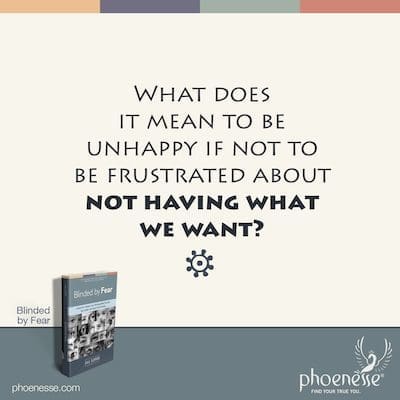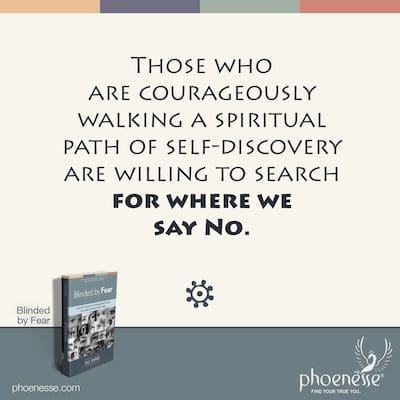Every person on Earth has an apparently nonsensical fear of bliss to some extent. Even though it makes no sense, there it is, and this fear exists side-by-side with our longing for bliss. Yet bliss is our birthright. We have every right to live in a state of supreme bliss and sublime joy, which are qualities we struggle to adequately describe in any language.
No matter how unhappy we are, somewhere deep inside we haven’t forgotten that this fear is not natural. Indeed, if this weren’t the case, it would be far easier to accept our frustrations in life. For what does it mean to be unhappy if not to be frustrated about not having what we want? Embedded in our unhappiness, then, is the promise that the opposite could be true: we could be happy. Since both are present, we feel ambivalent about how we should be experiencing life. From this follows another ambivalence: Is it OK to long for pleasure, or should we fear it?

For some of us, we have much less fear than desire. If this is us, we feel relatively fulfilled and our lives are rich and joyful. We have a deep capacity to experience pleasure, and we have a trusting attitude toward life. Since our concept of life is positive, life expands. For us, it’s not that hard to overcome our remaining defenses and fears that close off expanding further into bliss.
Most people, however, fear happiness more than they desire it. If this is us, we will basically be unhappy, feeling life is passing us by. Life will seem meaningless and like we somehow missed out on it. Our capacity for experiencing pleasure will be very limited. We will be numb and mired in apathy. In our lifeless state we won’t trust and will be withdrawn from life, and we will resist looking within ourselves for the cause of our suffering.
When we have a heavy fear-to-desire ratio, our negative concept of life seems to justify our defenses, and we fear expanding into a different state of consciousness. Our fears cause us to hang on desperately to the very state that’s responsible for our plight in life. This is the sorry predicament so many of us find ourselves in.
There is another subset of people who have an even balance between fear and desire for happiness. If this is us, we have areas of our lives that are abundant, successful and fulfilling. But we also have areas where we experience the opposite. The more we poke around in our psyche, the more apparent it becomes that where we are happy, fearless and free, we feel fulfilled. And where we are afraid of the best life can offer, we are not fulfilled. This is a mathematical equation that always comes out right in the end.
Awareness
Of course, we’re usually unaware that we fear what we want the most. Plus, the further away the thing we want is, the easier it is to overlook our fear of it. But as it comes closer, and as we sincerely question our reactions, we’ll find that on the inside, we’re closing the doors. Our shrinking away may be so subtle it’s easy to miss. But this is exactly what we need to bring out into the open.
This part may not be easy to find. For some, especially those who aren’t yet acquainted with the nature of the human unconscious, this concept—that we fear what we most long for—may be hard to swallow. And yet it’s true: The thing we cry the most for is the thing we fear the most. But if we will notice the places where taking the tiniest risk seems like too much, then we have a clue. For we tend to cringe from what we want, preferring to play it safe and stick with a gray life.
Once we’ve found this tendency in ourselves, we’re starting to make progress toward freedom. Now we’re catching on that our own hidden thoughts, emotions and attitudes are what create our fate. That, and nothing else. This discovery has the potential to rock our world. Before then, our tension and suffering will be all that much greater, because we won’t understand what’s causing them.
When we feel like we’re the victim of a hazardous world, and we think we have to defend ourselves, we drift farther and farther from the center of truth. The more self-alienated we become, the more we blame the world for causing our alienation, which brings us less and less relief. No matter how wrong the other may be, making them merit our blame, this never removes our suffering. No matter how much we can bend others to comply with our wishes, this never moves the meter on our feelings of emptiness.
And we will go on suffering as long we remain unaware that the blocks closing us off from what we want the most are in us. For that long, we will feel like life is futile. We’ll feel helpless and nothing we do will lessen our pain of feeling unfulfilled. There we will teeter between bitterness and self-pity, between distorted self-blame and projecting all our misfortunes onto life and others. In no way will we sense we deserve the best life has to offer.

Our inner No
So what’s the first step we can take to release the lever on this block? We must truly know and experience our own rejection of pleasure. At first, we are apt to fight this truth, tooth and nail. For many of us, we’d rather stay dependent on outer circumstances, even though accepting the great truth that we hold the key to freedom in our hands is the most joyful discovery we’ll ever make on this path.
Once we see the full impact of this truth, we’ll see that there is indeed only one way out. But we’ll never see the beauty of this reality if we’re still battling against it. True independence, then, will continue to elude us.
Often, when we sense that there could be more to life than we are now experiencing, we become cynical, and we resign ourselves to what we have. But those who are courageously walking a spiritual path of self-discovery have decided to take a different tack: We are willing to search for where we say No. We come to understand that the more strained and compulsive we feel, and the more urgent and impatient our striving for fulfillment is, the more certain we can be that underneath is just as rigid a No as on the surface there is an urgent Yes.
The surface urge is really not helping anything. In fact, it’s as big a hindrance as our underground No, because our surface Yes is made out of fear and distortion. Our urgent Yes is born of the unconscious knowledge that inside we’re blocking off a Yes. Now this doesn’t mean that if there’s no urgent Yes toward fulfillment on the surface, there’s not a hidden No below. Some people just behave differently than others. Or it could just mean we’ve given up. Whatever the situation, we won’t be able to relax a painful, anxious urge until we find personally and specifically how we say No to what we want the most.
Standing in truth
Through all of these teachings from the Pathwork Guide, we are being taught about the human condition. For instance, when we ignore how we deny our own fulfillment, we are creating difficulties for ourselves. When we project what we lack as being outside of ourselves—placing blame on circumstances or other people—we create more frictions and constrictions for ourselves. We create confusion and more entanglements, ultimately becoming more dependent.
If we continue to look away from our inner obstructions, preferring to believe that others or fate are the cause of all our problems, we then can’t help but live in tension and fear. So we can see that awareness—of our own obstructions—determines everything. With this understanding, we can comprehend the true meaning of self-responsibility.
Now let’s connect these ideas with a deeper understanding of this all-important mystery: Why do we say No to our deepest desire for the most intense bliss imaginable? What makes happiness seem dangerous and therefore undesirable? Let’s focus our light in this direction.
To whatever degree we reject ourselves, to that degree we will not be able to bear happiness or sustain pleasure. And why do we reject ourselves? In fact, all self-rejection falls into one of two camps.
First, there is a kind of self-rejection that’s based on a precision instrument inside us, if you will, that can measure where and in exactly what way we have broken spiritual laws. It knows where we have attempted to cheat life, hoping to get more than we wish to give. It knows all about our little hidden games of deception, and it sees how we dramatize and pretend we are better than we are, not daring to be who and how we actually are, right now.
When we do this, we don’t really love, we just pretend to love, hoping to get something in return. But the key to the universe is real love, not fake love, like the clinging, bartering love we often give. Genuine love lives and lets others live in freedom; it can take No for an answer. False love works more like a lasso that wants to dominate and hold tight. It may seem like we can fool others with our false love, but our real inner self cannot be deceived.
Where do we come up short in terms of generosity? Do we have a different yardstick for how others should measure up versus ourselves? All these violations go on all the time, and our Real Self is keeping notes. Meanwhile, our conscious mind is busy blotting out the truth, and in this way, we commit the gravest violation of them all. It’s one thing that we do these things, but it’s worse that we inwardly lie to cover them up.
Our pretenses deny and falsify the record, creating a double violation. And this leads to the most painful state, mentally and emotionally. We become caught in this double bind from which there appears to be no exit. Until, that is, we start to see what we’ve been doing. We must uncover our violations, own up to our inner lies, and let it all go.
What does that look like, this housecleaning we all need to do? Let’s say we are selfish. If we pretend like our selfishness is really just us being self-assertive, we’re rationalizing, and that creates a layer of falsehood. Or maybe we have a cruel streak, or we hate. If we only feel cruelty and hate in secret, and only act it out indirectly so that it looks like its opposite, we can add hypocrisy to our list of crimes against humanity.
Our hypocrisy may be out in the open for all to see, or we might hide it extremely well. It’s just as poisonous either way. But if, on the other hand, we have the courage to admit what we’re up to, and can look at ourselves squarely and honestly, we will have already made great strides in overcoming our violation.
By accepting the truth about ourselves, we step into a general climate of truth. Now we’re standing on a platform from which we just might be able to work ourselves out of our harmful behaviors. For sure, we’ll still struggle with it. But now we can start to understand it. By meditating for help and guidance, our feelings may spontaneously change.
For we may have a change of heart now that we are operating in alignment with spiritual laws. In addition, by accepting our present state, we are setting up inner conditions that are compatible with bliss. Maybe we have to admit, “I can’t help feeling this way, even though I don’t like it and I know it’s destructive.” At least now we are being truthful, and we are making room for change.
Anything in us that goes against the grain of truth and love makes our being unable to sustain happiness, for happiness is a powerful positive energy. It takes more strength to be happy than to be unhappy, and we acquire this strength by facing the truth and shedding our illusions about life.

Perfectionism
The second reason we reject ourselves is because of our imaginary violations when we don’t live up to our unrealistic standards of perfection. Perfectionism, as we all know, has extremely demanding and rigid ideals. Our efforts to adhere to them stem from yet another violation of spiritual law, and not because we are overdosing on morality.
Perfectionism sprouts from our pride and vanity, our need to be in control, our pretense, and our fear of standing up for ourselves. In short, it amounts to being untrue to ourselves out of greed for approval and admiration. So whenever we can’t accept our own humanity, including our current limitations, we are violating universal law. Then the climate of our psyche is not compatible with that bliss we all long for.
Sound simple? It’s really not. For when we embark on a path of inner exploration, self-rejection can be hard to find, and the reasons behind it even more obscure. Typically, we’re only aware of what we’re pretending to ourselves to be. For example, if we’ve locked certain emotions away because we can’t bear feeling them, we genuinely believe they are gone. Then we kid ourselves that we already know all about ourselves.
Therefore, it’s not that easy to find out how we’re really operating. We’ll need to point ourselves in a new direction to develop a new awareness of the emotional reactions we’ve habitually been glossing over. But our awareness of how we violate spiritual law will reveal, in equal measure, an awareness of how we are rejecting happiness.
Whether we’re just starting out on a spiritual path, haven’t yet begun, or have been making some pretty good headway, the advice is the same: Find the place in life where something seems to be missing, where you want to have more feelings or experience more intensely, and go in that direction. Find what you don’t accept in yourself. Close your eyes and see what you don’t like. Search for the obscure but tangible reaction that pushes away pleasure. Become willing to see what you haven’t seen before.
With this approach, we will experience, one step at a time, where we push a part of ourselves away. Over time, as we stop doing that, we’ll become better equipped to have happy feelings. It takes a fine awareness to pick up subtle soul movements that pull back when something good comes along. When we discover this, the rage that blames others, life or circumstances will subside.
With this, the poisonous clouds floating through our psyche will lift, making our inner home compatible with the bliss we have every right to enjoy. Accepting the truth in ourselves, then, is synonymous with accepting happiness. We can’t have one without the other.
There’s a third leg on this inner stool, and it’s recognizing the creative substance that’s molding our lives. For nothing that happens is haphazard. There’s no outside power deciding how much fulfillment we get to have. There is no force sending us pain or suffering. There’s no frustration we’re required to bear.
In fact, unfulfillment isn’t so much self-punishment as it is inner pollution that squelches bliss and joy. We ignore the truth of what we are and do, and don’t realize that this is what creates hazards. The only way to clear such obstructions is self-responsibility. We need to face ourselves head on.
Asking for help
Truth is what creates inner security, trust and fearlessness; ignorance is what creates fear. And fear causes us to close up. Then our mind won’t use the powerful creative substance—the stuff we use to mold our lives—to create expansion, and we will instead invest in tightening up our perimeter with defenses.
Just as stagnation and frustration belong together, expansion and bliss are a matched set. This means we can’t expand—we can’t bring all our potential out into the world—unless we’re in a state of joyousness. Simply put, bliss is necessary for expansion.
The process of expansion is self-activating, and it blends the masculine and feminine principles—also referred to as activity and passivity—in perfect harmony. But if we fear expansion—in other words, we fear bliss—we’ll also fear growing and changing. So we do, in fact, fear our own built-in powers to create.
Like happiness, the qualities of pleasure, bliss and fulfillment require a lot of inner firmness and strength. Remember, being unhappy takes less strength than being happy. How do we generate this strength? By intentionally calling on the divine powers within ourselves. In response, they will help us sustain bliss, guiding us to not inadvertently close up against happiness.
Such prayers for support shouldn’t be saved for when our lives are in crisis. For when we’re happy we’re in a good place for becoming even more compatible with the creative powers that will make us better equipped for sustaining bliss. Then when we’re unhappy, it’s important we look at it as a meaningful lesson that can help lead us to further growth. Doing this will require contact with the innate wisdom that resides with these superior forces. So any day of the week is a good day to be asking for help and guidance.
Maybe we’re already accessing all the help, strength and inspiration we can receive through meditation. Perhaps we already know how effective divine contact is, how unfailing its response, and how unimaginable its wisdom. Yet during times of upheaval, when we’re involved in deep conflicts, we simply “forget.” But there will come a point when it won’t be so hard to remember to make contact, and we’ll become more proficient at using it when times are tough. This is indeed a key, to enlist these powers all the time.

The energy centers
Many of us are aware that all humans have certain energy centers, or chakras, within our beings. Each of these energy centers is related to a mental attitude. So when we change from being ignorant, fearful, self-alienated, hostile and distrusting, to becoming open, truthful, trustful and loving, our energy centers will open up.
Since there is an intimate connection between our spirit, mind and body, such an opening up—or waking up—will result in a distinct experience in the body. This is why our approach on this path of self-realization must include the whole personality.
As we learn to ascertain when a center is open, we’ll be able to use its energy to find the mental attitude associated with it. Likewise, we will see there’s a connection between our fear of pleasure and our energy centers. For when we’re in fear, these centers must necessarily be closed and cramped. As such, the life force can’t get in.
But when we open ourselves up to joy, pleasure and happiness on all levels of our being, our relaxed attitude of “letting be” will eventually open up these centers. Our work of developing self-awareness, facing the truth, and creating an inner connection with the universal forces of life, then, will enliven our entire being by activating these centers.
Most people walk around in a perpetually cramped state with clenched energy centers. Yet we’ve all incarnated precisely to discover the truth of spiritual laws and to see how we are out of alignment with them. When we stop deceiving ourselves, we will relax deeply, and in this undefended state our whole personality will come alive and be sweetly attuned with life.
The universal self
We can liken a functioning personality to an overall center, like a planet. Then imagine there is another center that is timeless and spaceless. This is the center of absolutely everything that ever has lived, is living, and will live. This universal center is so huge, it’s the same for everyone and everything.
Fully self-realized personality planets are always in the orbit of this universal spiritual center. They are open to it and therefore totally exposed to it. They’re never out of its sight and are always influenced by it. Their movements are completely in sync with it.
But most personality planets are more or less off-center. We have somehow managed to move out of the field of vision of the universal center, such that we are not exposed to it. Although the universal center never wavers, we sometimes close our personalities off to it, moving out of its field of vision, as it were.
At times we step wholly into the universal field; at other times we move out. Being in or out of tune with the universal source determines our level of aliveness and alignment with the truth. When positive attitudes carry the day—including self-awareness and self-acceptance—we are tuning into love and trust. In short, we are becoming more like the universal life center. We are converging. Our personality center will become charged and enlivened by the universal one, until we are soaked up by it.
When this happens, our personality will not be annihilated. The self will not be destroyed. For all of life actually already exists in the spiritual center, which enlivens everything. Death simply means we have become separated from the center, such that its light can’t shine on our personality and infuse it with energy.
Never lose sight of the fact that life is intrinsically safe. This is an unchangeable fact that no amount of separation from the spiritual center can deny. Ultimately, as long as we keep going, we’ll come to see the truth of this greater reality, and we’ll reunite with all that is.
“Be God!”
The Pathwork Guide
Read Original Pathwork Lecture #170: Fear of Bliss Versus Longing for It—The Energy Centers



